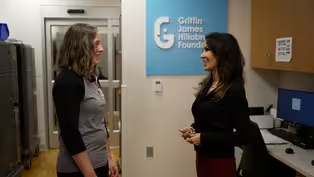Business | Life 360 with Kristi K.
ProMedica Total Rehab - Spider Cage
Clip: 11/16/2023 | 7m 57sVideo has Closed Captions
Kristi heads to ProMedica Total Rehab where she learns about the spider cage.
Kristi is informed by physical therapists at ProMedica Total Rehab about a system known as the spider cage. Through its usage of belts and punches, it stabilizes the gravity for the individual. This device, especially for young Flynn, helps him balance out his posture. Kristi meets with his parents and discusses how this device can help their son eventually stand on his own two feet.
Problems playing video? | Closed Captioning Feedback
Problems playing video? | Closed Captioning Feedback
Business | Life 360 with Kristi K. is a local public television program presented by WGTE
Business Life 360 with Kristi K. is made possible in part by KeyBank National Association Trustee for the Walter Terhune Memorial Fund and ProMedica Toledo Hospital, celebrating 150 years of serving our community.
Business | Life 360 with Kristi K.
ProMedica Total Rehab - Spider Cage
Clip: 11/16/2023 | 7m 57sVideo has Closed Captions
Kristi is informed by physical therapists at ProMedica Total Rehab about a system known as the spider cage. Through its usage of belts and punches, it stabilizes the gravity for the individual. This device, especially for young Flynn, helps him balance out his posture. Kristi meets with his parents and discusses how this device can help their son eventually stand on his own two feet.
Problems playing video? | Closed Captioning Feedback
How to Watch Business | Life 360 with Kristi K.
Business | Life 360 with Kristi K. is available to stream on pbs.org and the free PBS App, available on iPhone, Apple TV, Android TV, Android smartphones, Amazon Fire TV, Amazon Fire Tablet, Roku, Samsung Smart TV, and Vizio.
Providing Support for PBS.org
Learn Moreabout PBS online sponsorshipKristi K: Next up, we explore a pediatric innovation called the Spider Cage that is helping children with cerebral palsy and beyond gain strength and mobility.
Let's check it out.
So, Hannah, it's great to be with you here today at Promedica.
Total Rehab.
Hannah Saba: Thanks for having.
Kristi K: Me.
Absolutely.
So we're talking today about something called the Spider Cage, which is the only spider cage in our region.
Tell us what the function is.
Hannah Saba: So it's supposed to be like simulate like an aquatic environment.
So you have sponges in a harness system that goes around the waist and then the child in the cage has more of like a dynamic environment in there.
So it works at postural control, standing balance.
You could do sitting, you could do quadruped in it, hands and knees.
Lots of various positioning.
Kristi K: Very versatile.
Yes.
And also for patients, versatile for patients, two different kinds of needs that patients may have.
Hannah Saba: Absolutely.
So cerebral palsy, it can be just general developmental delay.
It could be like a stroke patient just hypotonia if kids have low tone, have trouble standing up on their own or sitting on their own, very versatile with diagnoses as well while they're in the cage, that harness system kind of takes away the need for the therapist's hands to be on the patient.
So then it lets me kind of facilitate other movements like head control or if I'm working on reaching with their arms, like I know they're safe in this harness system, that I don't have to be right there and worry about them falling.
Kristi K: Now you work in conjunction with occupational therapy to here, correct?
Hannah Saba: Correct.
Yes.
So that's another benefit.
If you have a second set of skilled hands, if Otis working on like some fine motor stuff, the can work on the gross motor aspects, the standing, the balance, the posture, and then the O.T.
can be in front of the patient kind of working on reaching visual gaze, head control.
Above all, Flynn loves bubbles.
Kristi K: Yes.
Yes.
So speaking of our patient today, our star patient today is Flynn.
Yes, Flynn.
Yes.
And tell us what we're going to be seeing with him today.
Hannah Saba: So I get Flynn in the cage.
He comes weekly for me here, and we're working on sitting balance postural control.
He cannot stand independently yet.
So when they get him in there, we're working on balance, weight shifting.
If I'm moving him side to side, working on sit to stand weight bearing through our legs, head control, we like to throw our head back a lot so that proprioception that the belt gives us allows his body kind of to know where he is in space, and then I can position the punches accordingly.
So the higher a position, the punches, it gives him a little more off gravity.
So it kind of helps eliminate that gravity and help him hold themselves up.
And then the lower I put them, it gives him more resistance for the strengthening piece.
It really can be adapted to any patient's needs.
What you're working on to provide like a sensory piece to it.
Kids like that vestibular piece, if they like the rocking, the bouncing, the movement aspect of it, that it is great for that.
So it also comes with a pulley system that can be used for range of motion and strengthening.
It comes with weighted bags as well.
So if you hook the different weight on the bungee system, you can work on strengthening a muscle before you work and standing.
If the child doesn't have the range of motion to stand up tall enough, then you could use the bungee or the pulley system first, get that range of motion in the joint, and then you move to the bungee system and work on that balance and stability piece.
Kristi K: So for any pediatric patient, is that what we're looking at?
What is the age for that?
Hannah Saba: Yep.
It can be held up to like £300.
So very versatile with any kiddo.
We see kids here up to about 18 years old, so very versatile.
Kristi K: And how can families find this?
So what do they need to do in order to get their child involved with the spider cage.
Hannah Saba: So they can call our clinic, call the front desk and set up an evaluation here with the p t, and then we evaluate the child, see their needs, and then set up appointments from there.
Kristi K: Well, we get to hear from Flynn's parents now, so I'm excited to hear what they have to say.
And the excitement that Flynn has.
We've been able to see him in action.
So let's go take a look.
Hannah Saba: Yeah.
Thanks so much for having me.
Kristi K: Thanks, Hannah.
So, Mikayla and Brad Mills, it's so good to have you here today.
BradMills: Thank you.
Kristi K: You're the parents of our cute Flynn.
Yes.
And we want to hear all about him as a very, very happy two year old.
Tell us more about Flynn.
Mikayla Mills: He loves to play.
He loves his dog.
Brad Mills: He loves to watch football with me.
And we watch sports all the time.
We watch SpongeBob.
We take our dog for walks.
He's always happy.
Mikayla Mills: He loves to learn.
So this is a great place for.
Kristi K: Yes.
And now he has cerebral palsy.
Yes.
And was diagnosed early.
Mikayla Mills: He was diagnosed about six months ago.
So there's a year and a half old when he got.
Kristi K: Diagnosed, being that this is the only outpatient rehab clinic that has a spider cage.
Tell us a little bit more about what you are hoping that Flynn can can get from this.
Mikayla Mills: To strengthen him, his whole body and mostly be independent on his own.
Brad Mills: He loves to go on his swing.
He likes when I put them on my shoulders and run him around his screams.
He tries.
He loves watching me play fetch with his dog.
And I can tell that he wishes he could kind of run around and play as well.
So this is perfect for him to teach him, to use his muscles and hopefully one day he'll be able to take his dog on walks themselves.
So yeah.
So.
I hope for.
Kristi K: That's great.
And I know he has occupational therapy today and physical therapy today.
We were all just noticing how much he loves his bubbles.
Yes, he he's there in his therapy.
He's thoroughly enjoying his time here.
Does he look forward to it?
Oh, yeah.
He knows when we pull up that we're coming here.
So he had.
Brad Mills: Gotten stronger since coming here.
He's shown much more improvement with what they're working on, so he's able to push up on his own.
Mikayla Mills: Now he's doing good at pushing up with both his arms.
Kristi K: So that's been beneficial already.
Oh, yeah, that's terrific.
Mikayla Mills: I think starting young and getting them involved in as much stuff possible is the best.
You get, the best outcome.
Kristi K: And you said he was home before this and came here.
So this is a really nice way for him then to get out and be a part of, you know, getting outdoors, being with other people.
Mikayla Mills: He loves seeing all the kids, like in the waiting room.
He'll scream at them and say, hi.
Kristi K: Good socialization as well as the OT and the T. Yes, well, you are wonderful parents and he's really lucky and blessed to have you.
Mikayla Mills: Thank you.
We're lucky to have him.
Kristi K: Well, thanks.
Thank you.
Again, he is so sweet and he's so energetic and he smiles so often.
And we love being with him and with you as well.
So thanks again.
Video has Closed Captions
Clip: 11/16/2023 | 7m 36s | Kristi meets with “Yan Can Cook” host, Chef Martin Yan. (7m 36s)
Griffin James Hillabrand Milk and Nutrition Lab
Video has Closed Captions
Clip: 11/16/2023 | 7m 32s | Kristi is at the Russell J. Ebeid Children's Hospital to talk about pediatric innovations. (7m 32s)
Providing Support for PBS.org
Learn Moreabout PBS online sponsorship
- News and Public Affairs

Top journalists deliver compelling original analysis of the hour's headlines.

- News and Public Affairs

FRONTLINE is investigative journalism that questions, explains and changes our world.












Support for PBS provided by:
Business | Life 360 with Kristi K. is a local public television program presented by WGTE
Business Life 360 with Kristi K. is made possible in part by KeyBank National Association Trustee for the Walter Terhune Memorial Fund and ProMedica Toledo Hospital, celebrating 150 years of serving our community.

